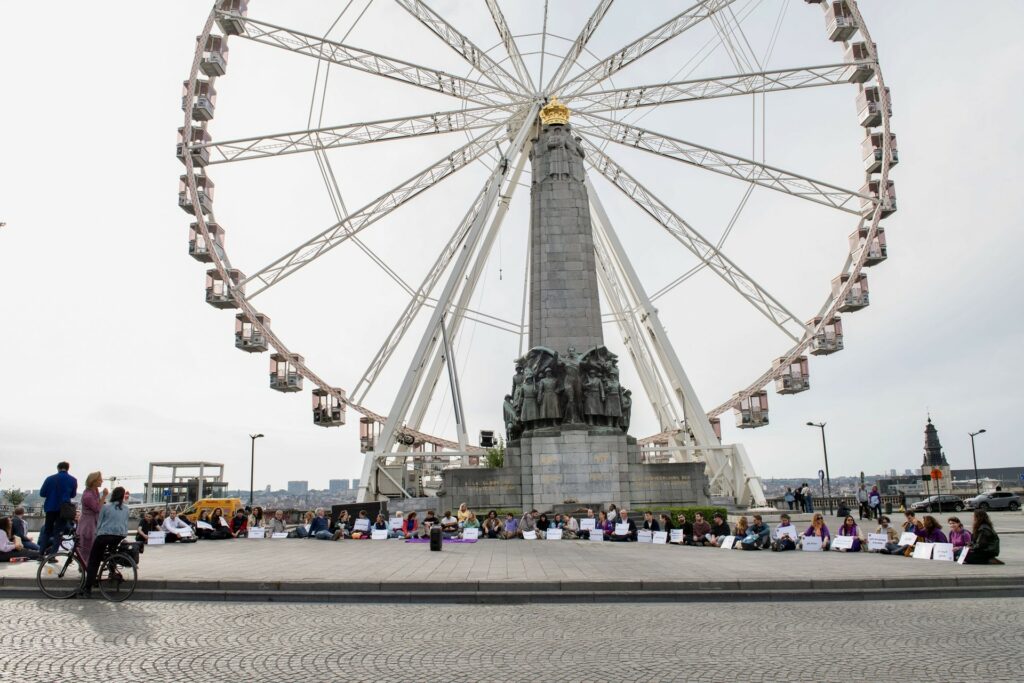A group of activists gathered on Thursday evening at Place Poelaert in Brussels in a sit-in to demonstrate for an end to the war in Gaza, the release of all the hostages and a peaceful solution of the Israeli-Palestinian conflict.
Hamas terror attack on 7 October and the still on-going war has resulted in an unprecedented destruction and humanitarian crisis in Gaza. It also divided Belgium and was instrumentalised by some politicians in the recent election campaigns. The joint Jewish-Muslim action is a small glimpse of hope in a polarized situation which has fueled hate speech and despair about the future.
The group represents ‘Belgian Friends of Standing Together’ and is inspired by ‘Standing Together’, an Israeli social-political grassroot movement founded in 2015. The latter has become known for actions such as protecting humanitarian aid convoys against violent Israeli settlers and shielding Palestinians in the old city of Jerusalem during the recent Flag March in the city.
“We support their message and fight on the ground to end the cycle of violence and imagine a future of security and dignity for all,” Wassim Allouka and Larry Waknine, two of the board members of the Belgian group, told The Brussels Times. Both are graduates in politics and economy and engaged in socio-economic issues.
Indirectly referring to president Biden's recent roadmap for an exit from the war in Gaza, the group called for a sustainable ceasefire and hostage deal now. An end to the bloodshed and an end to the Israeli occupation of Palestinian territories. Without specifying the future political solution, they also called for equality and safety for all and a better future for Palestinians and Israelis.
In its founding manifesto, the group writes that the real fight is not against each other, but against those who spread hate. “We condemn the extremists on both sides.”
The group underlines the importance of recognizing the different narratives and interests of the Israeli and Palestinian peoples to promote understanding. It starts with a dialogue which should become mainstream. A constructive dialogue could lead to a common narrative of two peoples sharing the same land.
A basic tenet is that there is no military solution to the conflict. If Israel wants to get rid of Hamas and its jihadist-terrorist ideology bent on the destruction of the Jewish state, it must disrupt its ideology and allow a political alternative for a better future. Without such an alternative, which offers peace and independence for the Palestinians, Hamas will continue to fill the vacuum.
The group supports the recognition of a Palestinian state. It is also open to other solutions in the long-term such as a federation or confederation of two states but prefers to talk in terms of mutual recognition of the rights of both peoples, including the right to national self-determination.
What about the slogan to "liberate Palestine from the river to the sea", which has been used in pro-Palestinian demonstrations? It can be interpreted differently by different people, the activists replied, liberation for Palestinians, the destruction of Israel for Jews who consider it their homeland.
Despite the gap, the group hopes that it is possible to find common ground which those who are shouting it in the streets or declaring it in political fora. “We in Standing Together have our own slogans. Equality in the same area. Where everyone is protected.”
In the action on Thursday, the group changed the anti-Israeli meaning of the slogan: “From the river to the sea, only peace can set us free”.
The group started in October with its own ideas and found that there are Jewish and Muslim youth in Belgium that share the same values and approach. Since then, its membership has been steadily growing and its actions has attracted participants from other organisations in the local Jewish and Muslim communities.
The objective is to create a platform and safe space for discussion between the Jewish and Muslim communities in Belgium, promoting understanding despite differences and prejudices and highlighting their common values rather than the things that divide them.
M. Apelblat
The Brussels Times

